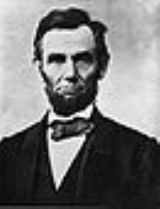
Military leadership in the American Civil War
Encyclopedia
Military leadership in the American Civil War was influenced by professional
military education
and the hard-earned pragmatism
of command experience. While not all leaders had formal military training, the United States Military Academy
at West Point
and the United States Naval Academy
at Annapolis
created dedicated cadres of professional officer
s whose understanding of military science
had profound effect on the conduct of the American Civil War
and whose lasting legacy helped forge the traditions of the modern U.S. officer corps of all service branches.
Abraham Lincoln
was Commander-in-Chief
of the Union armed forces
throughout the conflict; after his April 14, 1865 assassination
Vice-President Andrew Johnson
became the nation's chief executive
. Lincoln's first Secretary of War
was Simon Cameron
; Edwin M. Stanton
was confirmed to replace Cameron in January 1862. Thomas A. Scott was Assistant Secretary of War. Gideon Welles
was Secretary of the Navy
, aided by Assistant Secretary of the Navy
Gustavus Fox
.
or "Regular army" consisted of only 1080 commissioned officers
and 15,000 enlisted
men. Although 142 regular officers became Union generals during the war, most remained "frozen" in their regular units. That stated, most of the major Union wartime commanders had significant previous regular army experience.
, each state
recruited, trained, equipped, and maintained local militia
; regiment
al officers were appointed and promoted
by state governor
s. After states answered Lincoln's April 15, 1861, ninety-day call for 75,000 volunteer soldiers, most Union
states' regiments and batteries
became known as "Volunteers" to distinguish between state and regular army units. Union brigade
-level officers (generals) could receive two different types of Federal commissions
: U.S. Army or U.S. Volunteers (ex: Major General
, U.S.A. as opposed to Major General, U.S.V.). While most Civil War generals held volunteer or brevet
rank, many generals held both types of commission; regular rank was considered superior.
during the Civil War contributed enormously to the North's ability to effectively blockade
ports and Confederate shipping from quite early in the conflict. Handicapped by an aging 90 ship fleet, and despite significant manpower losses to the Confederate Navy after secession, a massive ship construction campaign embracing technological innovations from civil engineer
James Buchanan Eads
and naval engineers like Benjamin F. Isherwood
and John Ericsson
, along with four years' daily experience with modern naval conflict put the U. S. Navy onto a path which has led to today's world naval dominance.
was named provisional president
on February 9, 1861, and assumed similar commander-in-chief responsibilities as would Lincoln; on November 6, 1861 Davis was elected President of the Confederate States of America
under the Confederate Constitution. Several served the Confederacy as Secretary of War, including Leroy Pope Walker
, Judah P. Benjamin
, George W. Randolph
, James Seddon
, and John C. Breckinridge
. Stephen Mallory
was Confederate Secretary of the Navy throughout the conflict.
, many regular officers felt they could not betray loyalty to their home state, as a result some 313 of those officers resigned their commission and in many cases took up arms for the Confederate Army. Himself a graduate of West Point and a former regular officer, Confederate President Jefferson Davis highly prized these valuable recruits to the cause and saw that former regular officers were given positions of authority and responsibility.
and Andrew Jackson
, the state militiary tradition was especially strong in southern states, some of which were until recently frontier areas. Several significant Confederate military leaders emerged from state unit commands.
facilities; instead it relied on refitting captured ships or purchased warships from Great Britain
. The South had abundant navigable
inland waterways
, but after the Union built a vast fleet of gunboats, they soon dominated the Mississippi
, Tennessee
, Cumberland
, Red
and other rivers, rendering those waterways almost useless to the Confederacy. Confederates did seize several Union Navy vessels in harbor after secession, and converted a few into ironclads, like the CSS Virginia
. Blockade runners were built and operated by British naval interests, although by late in the war the C.S. Navy operated some. A few new vessels were built or purchased in Britain, notably the CSS Shenandoah
and the CSS Alabama
. These warships acted as raiders, wreaking havoc with commercial shipping. Aggrieved by these losses, in 1871 the U.S. government was awarded damages from Great Britain in the Alabama Claims
.
Professional
A professional is a person who is paid to undertake a specialised set of tasks and to complete them for a fee. The traditional professions were doctors, lawyers, clergymen, and commissioned military officers. Today, the term is applied to estate agents, surveyors , environmental scientists,...
military education
Military education and training
Military education and training is a process which intends to establish and improve the capabilities of military personnel in their respective roles....
and the hard-earned pragmatism
Pragmatism
Pragmatism is a philosophical tradition centered on the linking of practice and theory. It describes a process where theory is extracted from practice, and applied back to practice to form what is called intelligent practice...
of command experience. While not all leaders had formal military training, the United States Military Academy
United States Military Academy
The United States Military Academy at West Point is a four-year coeducational federal service academy located at West Point, New York. The academy sits on scenic high ground overlooking the Hudson River, north of New York City...
at West Point
West Point, New York
West Point is a federal military reservation established by President of the United States Thomas Jefferson in 1802. It is a census-designated place located in Town of Highlands in Orange County, New York, United States. The population was 7,138 at the 2000 census...
and the United States Naval Academy
United States Naval Academy
The United States Naval Academy is a four-year coeducational federal service academy located in Annapolis, Maryland, United States...
at Annapolis
Annapolis, Maryland
Annapolis is the capital of the U.S. state of Maryland, as well as the county seat of Anne Arundel County. It had a population of 38,394 at the 2010 census and is situated on the Chesapeake Bay at the mouth of the Severn River, south of Baltimore and about east of Washington, D.C. Annapolis is...
created dedicated cadres of professional officer
Officer (armed forces)
An officer is a member of an armed force or uniformed service who holds a position of authority. Commissioned officers derive authority directly from a sovereign power and, as such, hold a commission charging them with the duties and responsibilities of a specific office or position...
s whose understanding of military science
Military science
Military science is the process of translating national defence policy to produce military capability by employing military scientists, including theorists, researchers, experimental scientists, applied scientists, designers, engineers, test technicians, and military personnel responsible for...
had profound effect on the conduct of the American Civil War
American Civil War
The American Civil War was a civil war fought in the United States of America. In response to the election of Abraham Lincoln as President of the United States, 11 southern slave states declared their secession from the United States and formed the Confederate States of America ; the other 25...
and whose lasting legacy helped forge the traditions of the modern U.S. officer corps of all service branches.
  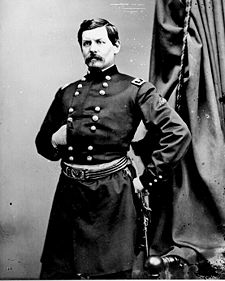 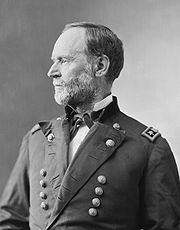 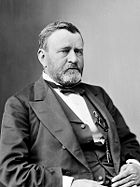  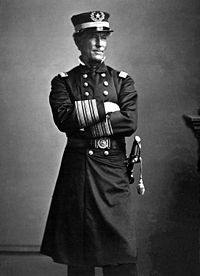 |
Civilian Military Leaders
PresidentPresident of the United States
The President of the United States of America is the head of state and head of government of the United States. The president leads the executive branch of the federal government and is the commander-in-chief of the United States Armed Forces....
Abraham Lincoln
Abraham Lincoln
Abraham Lincoln was the 16th President of the United States, serving from March 1861 until his assassination in April 1865. He successfully led his country through a great constitutional, military and moral crisis – the American Civil War – preserving the Union, while ending slavery, and...
was Commander-in-Chief
Commander-in-Chief
A commander-in-chief is the commander of a nation's military forces or significant element of those forces. In the latter case, the force element may be defined as those forces within a particular region or those forces which are associated by function. As a practical term it refers to the military...
of the Union armed forces
Armed forces
The armed forces of a country are its government-sponsored defense, fighting forces, and organizations. They exist to further the foreign and domestic policies of their governing body, and to defend that body and the nation it represents from external aggressors. In some countries paramilitary...
throughout the conflict; after his April 14, 1865 assassination
Assassination
To carry out an assassination is "to murder by a sudden and/or secret attack, often for political reasons." Alternatively, assassination may be defined as "the act of deliberately killing someone, especially a public figure, usually for hire or for political reasons."An assassination may be...
Vice-President Andrew Johnson
Andrew Johnson
Andrew Johnson was the 17th President of the United States . As Vice-President of the United States in 1865, he succeeded Abraham Lincoln following the latter's assassination. Johnson then presided over the initial and contentious Reconstruction era of the United States following the American...
became the nation's chief executive
Executive (government)
Executive branch of Government is the part of government that has sole authority and responsibility for the daily administration of the state bureaucracy. The division of power into separate branches of government is central to the idea of the separation of powers.In many countries, the term...
. Lincoln's first Secretary of War
United States Secretary of War
The Secretary of War was a member of the United States President's Cabinet, beginning with George Washington's administration. A similar position, called either "Secretary at War" or "Secretary of War," was appointed to serve the Congress of the Confederation under the Articles of Confederation...
was Simon Cameron
Simon Cameron
Simon Cameron was an American politician who served as United States Secretary of War for Abraham Lincoln at the start of the American Civil War. After making his fortune in railways and banking, he turned to a life of politics. He became a U.S. senator in 1845 for the state of Pennsylvania,...
; Edwin M. Stanton
Edwin M. Stanton
Edwin McMasters Stanton was an American lawyer and politician who served as Secretary of War under the Lincoln Administration during the American Civil War from 1862–1865...
was confirmed to replace Cameron in January 1862. Thomas A. Scott was Assistant Secretary of War. Gideon Welles
Gideon Welles
Gideon Welles was the United States Secretary of the Navy from 1861 to 1869. His buildup of the Navy to successfully execute blockades of Southern ports was a key component of Northern victory of the Civil War...
was Secretary of the Navy
United States Secretary of the Navy
The Secretary of the Navy of the United States of America is the head of the Department of the Navy, a component organization of the Department of Defense...
, aided by Assistant Secretary of the Navy
Assistant Secretary of the Navy
Assistant Secretary of the Navy is the title given to certain civilian senior officials in the United States Department of the Navy....
Gustavus Fox
Gustavus Fox
Gustavus Vasa Fox was an officer of the United States Navy, who served during the Mexican-American War, and as Assistant Secretary of the Navy during the Civil War.-Biography:...
.
Regular Army Officers
When the war began, the American standing armyStanding army
A standing army is a professional permanent army. It is composed of full-time career soldiers and is not disbanded during times of peace. It differs from army reserves, who are activated only during wars or natural disasters...
or "Regular army" consisted of only 1080 commissioned officers
Officer (armed forces)
An officer is a member of an armed force or uniformed service who holds a position of authority. Commissioned officers derive authority directly from a sovereign power and, as such, hold a commission charging them with the duties and responsibilities of a specific office or position...
and 15,000 enlisted
Enlisted rank
An enlisted rank is, in most Militaries, any rank below a commissioned officer or warrant officer. The term can also be inclusive of non-commissioned officers...
men. Although 142 regular officers became Union generals during the war, most remained "frozen" in their regular units. That stated, most of the major Union wartime commanders had significant previous regular army experience.
- Robert Anderson
- Don Carlos BuellDon Carlos BuellDon Carlos Buell was a career United States Army officer who fought in the Seminole War, the Mexican-American War, and the American Civil War. Buell led Union armies in two great Civil War battles—Shiloh and Perryville. The nation was angry at his failure to defeat the outnumbered...
- John BufordJohn BufordJohn Buford, Jr. was a Union cavalry officer during the American Civil War, with a prominent role at the start of the Battle of Gettysburg.-Early years:...
- Ambrose BurnsideAmbrose BurnsideAmbrose Everett Burnside was an American soldier, railroad executive, inventor, industrialist, and politician from Rhode Island, serving as governor and a U.S. Senator...
- Edward CanbyEdward CanbyEdward Richard Sprigg Canby was a career United States Army officer and a Union general in the American Civil War, Reconstruction era, and the Indian Wars...
- Philip St. George CookePhilip St. George CookePhilip St. George Cooke was a career United States Army cavalry officer who served as a Union General in the American Civil War. He is noted for his authorship of an Army cavalry manual, and is sometimes called the "Father of the U.S...
- Samuel CurtisSamuel CurtisSamuel Ryan Curtis was an American military officer, and one of the first Republicans elected to Congress. He was most famous for his role as a Union Army general the Trans-Mississippi Theater of the American Civil War.-Biography:Born near Champlain, New York, Curtis graduated from the United...
- Abner DoubledayAbner DoubledayAbner Doubleday was a career United States Army officer and Union general in the American Civil War. He fired the first shot in defense of Fort Sumter, the opening battle of the war, and had a pivotal role in the early fighting at the Battle of Gettysburg. Gettysburg was his finest hour, but his...
- Ulysses S. GrantUlysses S. GrantUlysses S. Grant was the 18th President of the United States as well as military commander during the Civil War and post-war Reconstruction periods. Under Grant's command, the Union Army defeated the Confederate military and ended the Confederate States of America...
- Henry Wager HalleckHenry Wager HalleckHenry Wager Halleck was a United States Army officer, scholar, and lawyer. A noted expert in military studies, he was known by a nickname that became derogatory, "Old Brains." He was an important participant in the admission of California as a state and became a successful lawyer and land developer...
- Winfield Scott HancockWinfield Scott HancockWinfield Scott Hancock was a career U.S. Army officer and the Democratic nominee for President of the United States in 1880. He served with distinction in the Army for four decades, including service in the Mexican-American War and as a Union general in the American Civil War...
- Joseph HookerJoseph HookerJoseph Hooker was a career United States Army officer, achieving the rank of major general in the Union Army during the American Civil War. Although he served throughout the war, usually with distinction, Hooker is best remembered for his stunning defeat by Confederate General Robert E...
- Andrew A. HumphreysAndrew A. HumphreysAndrew Atkinson Humphreys , was a career United States Army officer, civil engineer, and a Union General in the American Civil War. He served in senior positions in the Army of the Potomac, including division command, chief of staff, and corps command, and was Chief Engineer of the U.S...
- Henry Jackson HuntHenry Jackson HuntHenry Jackson Hunt was Chief of Artillery in the Army of the Potomac during the American Civil War. Considered by his contemporaries the greatest artillery tactician and strategist of the war, he was a master of the science of gunnery and rewrote the manual on the organization and use of artillery...
- George B. McClellanGeorge B. McClellanGeorge Brinton McClellan was a major general during the American Civil War. He organized the famous Army of the Potomac and served briefly as the general-in-chief of the Union Army. Early in the war, McClellan played an important role in raising a well-trained and organized army for the Union...
- Irvin McDowellIrvin McDowellIrvin McDowell was a career American army officer. He is best known for his defeat in the First Battle of Bull Run, the first large-scale battle of the American Civil War.-Early life:...
- James B. McPhersonJames B. McPhersonJames Birdseye McPherson was a career United States Army officer who served as a General in the Union Army during the American Civil War...
- Joseph K. MansfieldJoseph K. MansfieldJoseph King Fenno Mansfield was a career United States Army officer, civil engineer, and a Union general in the American Civil War, mortally wounded at the Battle of Antietam.-Early life:...
- George MeadeGeorge MeadeGeorge Gordon Meade was a career United States Army officer and civil engineer involved in coastal construction, including several lighthouses. He fought with distinction in the Second Seminole War and Mexican-American War. During the American Civil War he served as a Union general, rising from...
- Montgomery C. MeigsMontgomery C. MeigsMontgomery Cunningham Meigs was a career United States Army officer, civil engineer, construction engineer for a number of facilities in Washington, D.C., and Quartermaster General of the U.S. Army during and after the American Civil War....
- Edward OrdEdward OrdEdward Otho Cresap Ord was the designer of Fort Sam Houston, and a United States Army officer who saw action in the Seminole War, the Indian Wars, and the American Civil War. He commanded an army during the final days of the Civil War, and was instrumental in forcing the surrender of Confederate...
- John PopeJohn Pope (military officer)John Pope was a career United States Army officer and Union general in the American Civil War. He had a brief but successful career in the Western Theater, but he is best known for his defeat at the Second Battle of Bull Run in the East.Pope was a graduate of the United States Military Academy in...
- John F. ReynoldsJohn F. ReynoldsJohn Fulton Reynolds was a career United States Army officer and a general in the American Civil War. One of the Union Army's most respected senior commanders, he played a key role in committing the Army of the Potomac to the Battle of Gettysburg and was killed at the start of the battle.-Early...
- William RosecransWilliam RosecransWilliam Starke Rosecrans was an inventor, coal-oil company executive, diplomat, politician, and United States Army officer. He gained fame for his role as a Union general during the American Civil War...
- John SchofieldJohn SchofieldJohn McAllister Schofield was an American soldier who held major commands during the American Civil War. He later served as U.S. Secretary of War and Commanding General of the United States Army.-Early life:...
- Winfield ScottWinfield ScottWinfield Scott was a United States Army general, and unsuccessful presidential candidate of the Whig Party in 1852....
- Philip SheridanPhilip SheridanPhilip Henry Sheridan was a career United States Army officer and a Union general in the American Civil War. His career was noted for his rapid rise to major general and his close association with Lt. Gen. Ulysses S...
- William T. Sherman
- Andrew Jackson SmithAndrew Jackson SmithAndrew Jackson Smith was a United States Army general during the American Civil War, rising to the command of a corps. He was most noted for his victory over Confederate General S.D...
- William Farrar SmithWilliam Farrar SmithWilliam Farrar Smith , was a civil engineer, a member of the New York City police commission, and Union general in the American Civil War.-Early life:...
- George StonemanGeorge StonemanGeorge Stoneman, Jr. was a career United States Army officer, a Union cavalry general in the American Civil War, and the 15th Governor of California between 1883 and 1887.-Early life:...
- George Henry ThomasGeorge Henry ThomasGeorge Henry Thomas was a career United States Army officer and a Union General during the American Civil War, one of the principal commanders in the Western Theater....
- Alfred Thomas Archimedes Torbert
- John E. WoolJohn E. WoolJohn Ellis Wool was an officer in the United States Army during three consecutive U.S. wars: the War of 1812, the Mexican-American War and the American Civil War. By the time of the Mexican-American War, he was widely considered one of the most capable officers in the army and a superb organizer...
Militia and political leaders appointed to Union military leadership
Under the United States ConstitutionUnited States Constitution
The Constitution of the United States is the supreme law of the United States of America. It is the framework for the organization of the United States government and for the relationship of the federal government with the states, citizens, and all people within the United States.The first three...
, each state
U.S. state
A U.S. state is any one of the 50 federated states of the United States of America that share sovereignty with the federal government. Because of this shared sovereignty, an American is a citizen both of the federal entity and of his or her state of domicile. Four states use the official title of...
recruited, trained, equipped, and maintained local militia
Militia (United States)
The role of militia, also known as military service and duty, in the United States is complex and has transformed over time.Spitzer, Robert J.: The Politics of Gun Control, Page 36. Chatham House Publishers, Inc., 1995. " The term militia can be used to describe any number of groups within the...
; regiment
Regiment
A regiment is a major tactical military unit, composed of variable numbers of batteries, squadrons or battalions, commanded by a colonel or lieutenant colonel...
al officers were appointed and promoted
Promotion (rank)
A promotion is the advancement of an employee's rank or position in an organizational hierarchy system. Promotion may be an employee's reward for good performance i.e. positive appraisal...
by state governor
Governor
A governor is a governing official, usually the executive of a non-sovereign level of government, ranking under the head of state...
s. After states answered Lincoln's April 15, 1861, ninety-day call for 75,000 volunteer soldiers, most Union
Union (American Civil War)
During the American Civil War, the Union was a name used to refer to the federal government of the United States, which was supported by the twenty free states and five border slave states. It was opposed by 11 southern slave states that had declared a secession to join together to form the...
states' regiments and batteries
Artillery battery
In military organizations, an artillery battery is a unit of guns, mortars, rockets or missiles so grouped in order to facilitate better battlefield communication and command and control, as well as to provide dispersion for its constituent gunnery crews and their systems...
became known as "Volunteers" to distinguish between state and regular army units. Union brigade
Brigade
A brigade is a major tactical military formation that is typically composed of two to five battalions, plus supporting elements depending on the era and nationality of a given army and could be perceived as an enlarged/reinforced regiment...
-level officers (generals) could receive two different types of Federal commissions
Officer (armed forces)
An officer is a member of an armed force or uniformed service who holds a position of authority. Commissioned officers derive authority directly from a sovereign power and, as such, hold a commission charging them with the duties and responsibilities of a specific office or position...
: U.S. Army or U.S. Volunteers (ex: Major General
Major general (United States)
In the United States Army, United States Marine Corps, and United States Air Force, major general is a two-star general-officer rank, with the pay grade of O-8. Major general ranks above brigadier general and below lieutenant general...
, U.S.A. as opposed to Major General, U.S.V.). While most Civil War generals held volunteer or brevet
Brevet (military)
In many of the world's military establishments, brevet referred to a warrant authorizing a commissioned officer to hold a higher rank temporarily, but usually without receiving the pay of that higher rank except when actually serving in that role. An officer so promoted may be referred to as being...
rank, many generals held both types of commission; regular rank was considered superior.
- Edward D. Baker
- Nathaniel Prentice BanksNathaniel Prentice BanksNathaniel Prentice Banks was an American politician and soldier, served as the 24th Governor of Massachusetts, Speaker of the U.S. House of Representatives and as a Union general during the American Civil War....
- Francis Preston Blair, Jr.Francis Preston Blair, Jr.Francis Preston Blair, Jr. was an American politician and Union Army general during the American Civil War. He represented Missouri in both the House of Representatives and the Senate, and he was the Democratic Party's nominee for Vice President in 1868.-Early life and career:Blair was born in...
- Benjamin Franklin ButlerBenjamin Franklin Butler (politician)Benjamin Franklin Butler was an American lawyer and politician who represented Massachusetts in the United States House of Representatives and later served as the 33rd Governor of Massachusetts....
- John C. FrémontJohn C. FrémontJohn Charles Frémont , was an American military officer, explorer, and the first candidate of the anti-slavery Republican Party for the office of President of the United States. During the 1840s, that era's penny press accorded Frémont the sobriquet The Pathfinder...
- John Alexander McClernandJohn Alexander McClernandJohn Alexander McClernand was an American lawyer and politician, and a Union general in the American Civil War. He was a classic case of the politician-in-uniform coming into conflict with career Army officers, graduates of the United States Military Academy. He was a prominent Democratic...
- Daniel SicklesDaniel SicklesDaniel Edgar Sickles was a colorful and controversial American politician, Union general in the American Civil War, and diplomat....
Native American and international officers in Union Army
Reflecting the multi-national makeup of the soldiers engaged, some Union military leaders derived from nations other than the United States.- Philippe, Comte de ParisPhilippe, Comte de ParisPhilippe d'Orléans, Count of Paris was the grandson of Louis Philippe I, King of the French. He was a claimant to the French throne from 1848 until his death.-Early life:...
- Michael CorcoranMichael CorcoranMichael Corcoran was an Irish American general in the Union Army during the American Civil War and a close confidant of President Abraham Lincoln. As its colonel, he led the 69th New York regiment to Washington, D.C. and was one of the first to serve in the defense of Washington by building Fort...
- Włodzimierz Krzyżanowski
- Thomas Francis MeagherThomas Francis Meagher-Young Ireland:Meagher returned to Ireland in 1843, with undecided plans for a career in the Austrian army, a tradition among a number of Irish families. In 1844 he traveled to Dublin with the intention of studying for the bar. He became involved in the Repeal Association, which worked for repeal...
- Ely Parker
- Albin F. Schoepf
- Carl SchurzCarl SchurzCarl Christian Schurz was a German revolutionary, American statesman and reformer, and Union Army General in the American Civil War. He was also an accomplished journalist, newspaper editor and orator, who in 1869 became the first German-born American elected to the United States Senate.His wife,...
- Franz SigelFranz SigelFranz Sigel was a German military officer, revolutionist and immigrant to the United States who was a teacher, newspaperman, politician, and served as a Union major general in the American Civil War.-Early life:...
- Régis de TrobriandRégis de TrobriandPhilippe Régis Denis de Keredern de Trobriand was a French aristocrat, lawyer, poet, and novelist who emigrated at a young age to the United States...
- Ivan TurchaninovIvan TurchaninovIvan Vasilyevich Turchaninov , better known by his Anglicised name of John Basil Turchin, was a Union army brigadier general in the American Civil War...
Union Naval Leaders
The rapid rise of the United States NavyUnited States Navy
The United States Navy is the naval warfare service branch of the United States Armed Forces and one of the seven uniformed services of the United States. The U.S. Navy is the largest in the world; its battle fleet tonnage is greater than that of the next 13 largest navies combined. The U.S...
during the Civil War contributed enormously to the North's ability to effectively blockade
Union blockade
The Union Blockade, or the Blockade of the South, took place between 1861 and 1865, during the American Civil War, when the Union Navy maintained a strenuous effort on the Atlantic and Gulf Coast of the Confederate States of America designed to prevent the passage of trade goods, supplies, and arms...
ports and Confederate shipping from quite early in the conflict. Handicapped by an aging 90 ship fleet, and despite significant manpower losses to the Confederate Navy after secession, a massive ship construction campaign embracing technological innovations from civil engineer
Civil engineer
A civil engineer is a person who practices civil engineering; the application of planning, designing, constructing, maintaining, and operating infrastructures while protecting the public and environmental health, as well as improving existing infrastructures that have been neglected.Originally, a...
James Buchanan Eads
James Buchanan Eads
Captain James Buchanan Eads was a world-renowned American civil engineer and inventor, holding more than fifty patents.-Early life and education:...
and naval engineers like Benjamin F. Isherwood
Benjamin F. Isherwood
Benjamin Franklin Isherwood was an engineering officer in the United States Navy during the early days of steam-powered warships. He served as a ship's engineer during the Mexican–American War, and after the war did experimental work with steam propulsion...
and John Ericsson
John Ericsson
John Ericsson was a Swedish-American inventor and mechanical engineer, as was his brother Nils Ericson. He was born at Långbanshyttan in Värmland, Sweden, but primarily came to be active in England and the United States...
, along with four years' daily experience with modern naval conflict put the U. S. Navy onto a path which has led to today's world naval dominance.
- John A. DahlgrenJohn A. DahlgrenJohn Adolphus Bernard Dahlgren was a United States Navy leader. He headed the Union Navy's ordnance department during the American Civil War and designed several different kinds of guns and cannons that were considered part of the reason the Union won the war...
- Charles Henry DavisCharles Henry DavisCharles Henry Davis was a Rear Admiral in the United States Navy, serving primarily during the American Civil War, and with the United States Coast Survey.-Early life and career:...
- Samuel Francis du PontSamuel Francis du PontSamuel Francis Du Pont was an American naval officer who achieved the rank of Rear Admiral in the United States Navy, and a member of the prominent Du Pont family; he was the only member of his generation to use a capital D...
- David FarragutDavid FarragutDavid Glasgow Farragut was a flag officer of the United States Navy during the American Civil War. He was the first rear admiral, vice admiral, and admiral in the United States Navy. He is remembered in popular culture for his order at the Battle of Mobile Bay, usually paraphrased: "Damn the...
- Andrew Hull FooteAndrew Hull FooteAndrew Hull Foote was an American naval officer who was noted for his service in the American Civil War and also for his contributions to several naval reforms in the years prior to the war. When the war came, he was appointed to command of the Western Gunboat Flotilla, predecessor of the...
- Samuel Phillips LeeSamuel Phillips LeeSamuel Phillips Lee was a Rear Admiral of the United States Navy. He commanded the North Atlantic Blockading Squadron from 4 September 1862 to 12 October 1864. His flagship was Philadelphia.-Life and career:...
- David Dixon PorterDavid Dixon PorterDavid Dixon Porter was a member of one of the most distinguished families in the history of the United States Navy. Promoted as the second man to the rank of admiral, after his adoptive brother David G...
- John Ancrum WinslowJohn Ancrum WinslowRear Admiral John Ancrum Winslow was an officer in the United States Navy during the Mexican-American War and the American Civil War...
- John Lorimer WordenJohn Lorimer WordenJohn Lorimer Worden was a U.S. rear admiral who served in the American Civil War. He commanded Monitor against the Confederate vessel Virginia in first battle of ironclad ships in 1862.-Background and early career:Worden was born in Sparta, Mount PleasantTownship, Westchester County, New York...
The Confederacy
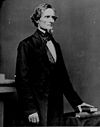 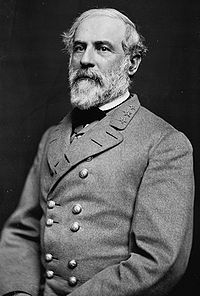 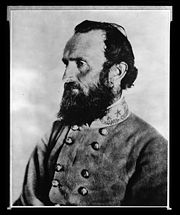  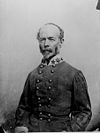 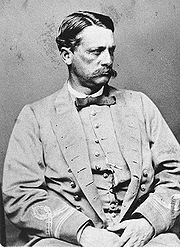 |
Civilian Military Leaders
Jefferson DavisJefferson Davis
Jefferson Finis Davis , also known as Jeff Davis, was an American statesman and leader of the Confederacy during the American Civil War, serving as President for its entire history. He was born in Kentucky to Samuel and Jane Davis...
was named provisional president
President
A president is a leader of an organization, company, trade union, university, or country.Etymologically, a president is one who presides, who sits in leadership...
on February 9, 1861, and assumed similar commander-in-chief responsibilities as would Lincoln; on November 6, 1861 Davis was elected President of the Confederate States of America
President of the Confederate States of America
The President of the Confederate States of America was the Head of State and Head of Government of the Confederate States of America, which was formed from the states which declared their secession from the United States, thus precipitating the American Civil War. The only person to hold the...
under the Confederate Constitution. Several served the Confederacy as Secretary of War, including Leroy Pope Walker
LeRoy Pope Walker
LeRoy Pope Walker was the first Confederate States Secretary of War.-Early life and career:Walker was born near Huntsville, Alabama in 1817, the son of John Williams Walker and Matilda Pope, and a grandson of LeRoy Pope. He was educated by private tutors, then attended universities in Alabama and...
, Judah P. Benjamin
Judah P. Benjamin
Judah Philip Benjamin was an American politician and lawyer. Born a British subject in the West Indies, he moved to the United States with his parents and became a citizen. He later became a citizen of the Confederate States of America. After the collapse of the Confederacy, Benjamin moved to...
, George W. Randolph
George W. Randolph
George Wythe Randolph was a lawyer, planter, and Confederate general. He served for eight months in 1862 as the Confederate States Secretary of War during the American Civil War, when he reformed procurement, wrote the conscription law, and strengthened western defenses...
, James Seddon
James Seddon
James Alexander Seddon was an American lawyer and politician who served two terms in the U.S. Congress as a member of the Democratic Party. He was appointed Confederate States Secretary of War by Jefferson Davis during the American Civil War.-Biography:Seddon was born in Falmouth, Stafford County,...
, and John C. Breckinridge
John C. Breckinridge
John Cabell Breckinridge was an American lawyer and politician. He served as a U.S. Representative and U.S. Senator from Kentucky and was the 14th Vice President of the United States , to date the youngest vice president in U.S...
. Stephen Mallory
Stephen Mallory
Stephen Russell Mallory served in the United States Senate as, Senator from Florida from 1850 to the secession of his home state and the outbreak of the American Civil War. For much of that period, he was chairman of the Committee on Naval Affairs...
was Confederate Secretary of the Navy throughout the conflict.
Former Regular Army Officers
In the wake of secessionSecession
Secession is the act of withdrawing from an organization, union, or especially a political entity. Threats of secession also can be a strategy for achieving more limited goals.-Secession theory:...
, many regular officers felt they could not betray loyalty to their home state, as a result some 313 of those officers resigned their commission and in many cases took up arms for the Confederate Army. Himself a graduate of West Point and a former regular officer, Confederate President Jefferson Davis highly prized these valuable recruits to the cause and saw that former regular officers were given positions of authority and responsibility.
- Richard H. AndersonRichard H. AndersonRichard Heron Anderson was a career U.S. Army officer, fighting with distinction in the Mexican-American War. He also served as a Confederate general during the American Civil War, fighting in the Eastern Theater of the conflict and most notably during the 1864 Battle of Spotsylvania Court House...
- Pierre Beauregard
- Braxton BraggBraxton BraggBraxton Bragg was a career United States Army officer, and then a general in the Confederate States Army—a principal commander in the Western Theater of the American Civil War and later the military adviser to Confederate President Jefferson Davis.Bragg, a native of North Carolina, was...
- Simon Bolivar Buckner, Sr.Simon Bolivar Buckner, Sr.Simon Bolivar Buckner fought in the United States Army in the Mexican–American War and in the Confederate States Army during the American Civil War. He later served as the 30th Governor of Kentucky....
- Samuel CooperSamuel Cooper (general)Samuel Cooper was a career United States Army officer, serving during the Second Seminole War and the Mexican-American War. Although little-known today, Cooper was also the highest ranking Confederate general during the American Civil War...
- Jubal Anderson EarlyJubal Anderson EarlyJubal Anderson Early was a lawyer and Confederate general in the American Civil War. He served under Stonewall Jackson and then Robert E. Lee for almost the entire war, rising from regimental command to lieutenant general and the command of an infantry corps in the Army of Northern Virginia...
- Richard Ewell
- Josiah GorgasJosiah GorgasJosiah Gorgas was one of the few Northern-born Confederate generals and was later president of the University of Alabama....
- William Joseph Hardee
- Ambrose Powell Hill
- Daniel Harvey HillDaniel Harvey HillOn July 22, 1862, Hill and Union Maj. Gen. John A. Dix concluded an agreement for the general exchange of prisoners between the Union and Confederate armies. This agreement became known as the Dix-Hill Cartel....
- John Bell HoodJohn Bell HoodJohn Bell Hood was a Confederate general during the American Civil War. Hood had a reputation for bravery and aggressiveness that sometimes bordered on recklessness...
- Thomas J. "Stonewall" JacksonStonewall Jacksonຄຽשת״ׇׂׂׂׂ֣|birth_place= Clarksburg, Virginia |death_place=Guinea Station, Virginia|placeofburial=Stonewall Jackson Memorial CemeteryLexington, Virginia|placeofburial_label= Place of burial|image=...
- Albert Sidney JohnstonAlbert Sidney JohnstonAlbert Sidney Johnston served as a general in three different armies: the Texas Army, the United States Army, and the Confederate States Army...
- Joseph E. JohnstonJoseph E. JohnstonJoseph Eggleston Johnston was a career U.S. Army officer, serving with distinction in the Mexican-American War and Seminole Wars, and was also one of the most senior general officers in the Confederate States Army during the American Civil War...
- Robert E. LeeRobert E. LeeRobert Edward Lee was a career military officer who is best known for having commanded the Confederate Army of Northern Virginia in the American Civil War....
- James LongstreetJames LongstreetJames Longstreet was one of the foremost Confederate generals of the American Civil War and the principal subordinate to General Robert E. Lee, who called him his "Old War Horse." He served under Lee as a corps commander for many of the famous battles fought by the Army of Northern Virginia in the...
- Dabney Herndon Maury
- John Hunt MorganJohn Hunt MorganJohn Hunt Morgan was a Confederate general and cavalry officer in the American Civil War.Morgan is best known for Morgan's Raid when, in 1863, he and his men rode over 1,000 miles covering a region from Tennessee, up through Kentucky, into Indiana and on to southern Ohio...
- John C. PembertonJohn C. PembertonJohn Clifford Pemberton , was a career United States Army officer who fought in the Seminole Wars and with distinction during the Mexican–American War. He also served as a Confederate general during the American Civil War, noted for his defeat and surrender in the critical Siege of Vicksburg in...
- Edmund Kirby SmithEdmund Kirby SmithEdmund Kirby Smith was a career United States Army officer and educator. He served as a general in the Confederate States Army during the American Civil War, notable for his command of the Trans-Mississippi Department of the Confederacy after the fall of Vicksburg.After the conflict ended Smith...
- Gustavus Woodson SmithGustavus Woodson SmithGustavus Woodson Smith , more commonly known as G.W. Smith, was a career United States Army officer who fought in the Mexican-American War, a civil engineer, and a major general in the Confederate States Army during the American Civil War.-Early life and Mexico:Smith was born in Georgetown,...
- J.E.B. StuartJ.E.B. StuartJames Ewell Brown "Jeb" Stuart was a U.S. Army officer from Virginia and a Confederate States Army general during the American Civil War. He was known to his friends as "Jeb", from the initials of his given names. Stuart was a cavalry commander known for his mastery of reconnaissance and the use...
- Joseph WheelerJoseph WheelerJoseph Wheeler was an American military commander and politician. He has the rare distinction of serving as a general during war time for two opposing forces: first as a noted cavalry general in the Confederate States Army in the 1860s during the American Civil War, and later as a general in the...
Militia and political leaders appointed to Confederate military leadership
The land of Davy CrockettDavy Crockett
David "Davy" Crockett was a celebrated 19th century American folk hero, frontiersman, soldier and politician. He is commonly referred to in popular culture by the epithet "King of the Wild Frontier". He represented Tennessee in the U.S...
and Andrew Jackson
Andrew Jackson
Andrew Jackson was the seventh President of the United States . Based in frontier Tennessee, Jackson was a politician and army general who defeated the Creek Indians at the Battle of Horseshoe Bend , and the British at the Battle of New Orleans...
, the state militiary tradition was especially strong in southern states, some of which were until recently frontier areas. Several significant Confederate military leaders emerged from state unit commands.
- John C. BreckinridgeJohn C. BreckinridgeJohn Cabell Breckinridge was an American lawyer and politician. He served as a U.S. Representative and U.S. Senator from Kentucky and was the 14th Vice President of the United States , to date the youngest vice president in U.S...
- Benjamin F. CheathamBenjamin F. CheathamBenjamin Franklin Cheatham , known also as Frank, was a Tennessee aristocrat, California gold miner, and a General in the Confederate States Army during the American Civil War, serving in many battles of the Western Theater.-Early years:Cheatham was born in Nashville, Tennessee on a plantation...
- Nathan Bedford ForrestNathan Bedford ForrestNathan Bedford Forrest was a lieutenant general in the Confederate Army during the American Civil War. He is remembered both as a self-educated, innovative cavalry leader during the war and as a leading southern advocate in the postwar years...
- Wade HamptonWade Hampton IIIWade Hampton III was a Confederate cavalry leader during the American Civil War and afterward a politician from South Carolina, serving as its 77th Governor and as a U.S...
- James L. KemperJames L. KemperJames Lawson Kemper was a lawyer, a Confederate general in the American Civil War, and the 37th Governor of Virginia...
- Ben McCulloch
- Leonidas PolkLeonidas PolkLeonidas Polk was a Confederate general in the American Civil War who was once a planter in Maury County, Tennessee, and a second cousin of President James K. Polk...
- Sterling PriceSterling PriceSterling Price was a lawyer, planter, and politician from the U.S. state of Missouri, who served as the 11th Governor of the state from 1853 to 1857. He also served as a United States Army brigadier general during the Mexican-American War, and a Confederate Army major general in the American Civil...
- Richard TaylorRichard Taylor (general)Richard Taylor was a Confederate general in the American Civil War. He was the son of United States President Zachary Taylor and First Lady Margaret Taylor.-Early life:...
Native American and international officers in Confederate army
While no foreign power sent troops or commanders directly to assist the Confederate States, some leaders derived from countries other than the United States.- Patrick CleburnePatrick CleburnePatrick Ronayne Cleburne was an Irish American soldier, best known for his service in the Confederate States Army during the American Civil War, where he rose to the rank of major general....
- Stand WatieStand WatieStand Watie , also known as Standhope Uwatie, Degataga , meaning “stand firm”), and Isaac S. Watie, was a leader of the Cherokee Nation and a brigadier general of the Confederate States Army during the American Civil War...
- Camille Armand Jules Marie, Prince de PolignacCamille Armand Jules Marie, Prince de PolignacCamille Armand Jules Marie, Prince de Polignac was a French nobleman, scholar and soldier who joined the Confederate States Army at the outbreak of the American Civil War and became major general before the end of the war...
- Raleigh E. ColstonRaleigh E. ColstonRaleigh Edward Colston was a French-born American professor, soldier, cartographer, and writer. He was a controversial brigadier general in the Confederate States Army during the American Civil War...
- Collett LeventhorpeCollett LeventhorpeCollett Leventhorpe was a brigadier general in the Confederate States Army during the American Civil War.-Early life:...
Confederate Naval Leaders
The Confederate Navy possessed no extensive shipbuildingShipbuilding
Shipbuilding is the construction of ships and floating vessels. It normally takes place in a specialized facility known as a shipyard. Shipbuilders, also called shipwrights, follow a specialized occupation that traces its roots to before recorded history.Shipbuilding and ship repairs, both...
facilities; instead it relied on refitting captured ships or purchased warships from Great Britain
Great Britain
Great Britain or Britain is an island situated to the northwest of Continental Europe. It is the ninth largest island in the world, and the largest European island, as well as the largest of the British Isles...
. The South had abundant navigable
Navigation
Navigation is the process of monitoring and controlling the movement of a craft or vehicle from one place to another. It is also the term of art used for the specialized knowledge used by navigators to perform navigation tasks...
inland waterways
Inland waterways of the United States
The inland waterways of the United States include over 25,000 miles of navigable waters. Much of the commercially important waterways of the United States consist of the Mississippi River System—the Mississippi River and connecting waterways.Almost all of the navigable rivers and canals in...
, but after the Union built a vast fleet of gunboats, they soon dominated the Mississippi
Mississippi River
The Mississippi River is the largest river system in North America. Flowing entirely in the United States, this river rises in western Minnesota and meanders slowly southwards for to the Mississippi River Delta at the Gulf of Mexico. With its many tributaries, the Mississippi's watershed drains...
, Tennessee
Tennessee River
The Tennessee River is the largest tributary of the Ohio River. It is approximately 652 miles long and is located in the southeastern United States in the Tennessee Valley. The river was once popularly known as the Cherokee River, among other names...
, Cumberland
Cumberland River
The Cumberland River is a waterway in the Southern United States. It is long. It starts in Harlan County in far southeastern Kentucky between Pine and Cumberland mountains, flows through southern Kentucky, crosses into northern Tennessee, and then curves back up into western Kentucky before...
, Red
Red River (Mississippi watershed)
The Red River, or sometimes the Red River of the South, is a major tributary of the Mississippi and Atchafalaya Rivers in the southern United States of America. The river gains its name from the red-bed country of its watershed. It is one of several rivers with that name...
and other rivers, rendering those waterways almost useless to the Confederacy. Confederates did seize several Union Navy vessels in harbor after secession, and converted a few into ironclads, like the CSS Virginia
CSS Virginia
CSS Virginia was the first steam-powered ironclad warship of the Confederate States Navy, built during the first year of the American Civil War; she was constructed as a casemate ironclad using the raised and cut down original lower hull and steam engines of the scuttled . Virginia was one of the...
. Blockade runners were built and operated by British naval interests, although by late in the war the C.S. Navy operated some. A few new vessels were built or purchased in Britain, notably the CSS Shenandoah
CSS Shenandoah
CSS Shenandoah, formerly Sea King, was an iron-framed, teak-planked, full rigged ship, with auxiliary steam power, captained by Commander James Waddell, Confederate States Navy, a North Carolinian with twenty years' service in the United States Navy.During 12½ months of 1864–1865 the ship...
and the CSS Alabama
CSS Alabama
CSS Alabama was a screw sloop-of-war built for the Confederate States Navy at Birkenhead, United Kingdom, in 1862 by John Laird Sons and Company. Alabama served as a commerce raider, attacking Union merchant and naval ships over the course of her two-year career, during which she never anchored in...
. These warships acted as raiders, wreaking havoc with commercial shipping. Aggrieved by these losses, in 1871 the U.S. government was awarded damages from Great Britain in the Alabama Claims
Alabama Claims
The Alabama Claims were a series of claims for damages by the United States government against the government of Great Britain for the assistance given to the Confederate cause during the American Civil War. After international arbitration endorsed the American position in 1872, Britain settled...
.
- John Mercer BrookeJohn Mercer BrookeJohn Mercer Brooke was an American sailor, engineer, scientist, and educator. He was instrumental in the creation of the Transatlantic Cable, and was a noted marine and military innovator.-Early life and career:...
- Isaac Newton Brown
- Franklin BuchananFranklin BuchananFranklin Buchanan was an officer in the United States Navy who became an admiral in the Confederate Navy during the American Civil War, and commanded the ironclad CSS Virginia.-Early life:...
- James Dunwoody BullochJames Dunwoody BullochJames Dunwody Bulloch was the Confederate States of America's chief foreign agent in Great Britain during the American Civil War. He was the half-brother of a distinguished Confederate naval officer, Irvine Bulloch and of Martha "Mittie" Bulloch Roosevelt. Mittie was the mother of future U.S...
- Catesby ap Roger JonesCatesby ap Roger JonesCatesby ap Roger Jones was an officer in the U.S. Navy who became a commander in the Confederate Navy during the American Civil War.-Biography:...
- Matthew Fontaine MauryMatthew Fontaine MauryMatthew Fontaine Maury , United States Navy was an American astronomer, historian, oceanographer, meteorologist, cartographer, author, geologist, and educator....
- Raphael SemmesRaphael SemmesFor other uses, see Semmes .Raphael Semmes was an officer in the United States Navy from 1826 - 1860 and the Confederate States Navy from 1860 - 1865. During the American Civil War he was captain of the famous commerce raider CSS Alabama, taking a record sixty-nine prizes...
- Josiah TattnallJosiah TattnallCommodore Josiah Tattnall, Jr. was an officer in the United States Navy during the War of 1812, the Second Barbary War, and the Mexican-American War. He later served in the Confederate Navy during the American Civil War....
- James Iredell WaddellJames Iredell WaddellJames Iredell Waddell was an officer in the United States Navy and later in the Confederate States Navy.-Biography:...
See also
- Civil War Generals
- History of Confederate States Army GeneralsHistory of Confederate States Army GeneralsThe general officers of the Confederate States Army - the army of the Confederate States of America - were the senior military leaders of the Confederacy and served during the American Civil War between 1861 and 1865...
- Confederate States Armed Forces
- Union ArmyUnion ArmyThe Union Army was the land force that fought for the Union during the American Civil War. It was also known as the Federal Army, the U.S. Army, the Northern Army and the National Army...
- Union Navy
Further reading
- American National Biography (20 vol. 2000; online and paper copies at academic libraries) short biographies by specialists
- Current, Richard N., et al. eds. Encyclopedia of the Confederacy (1993) (4 Volume set; also 1 vol abridged version) (ISBN 0-13-275991-8)
- Dictionary of American Biography 30 vol, 1934–1990; short biographies by specialists
- Faust, Patricia L. (ed.) Historical Times Illustrated Encyclopedia of the Civil War (1986) (ISBN 0-06-181261-7) 2000 short entries
- Heidler, David Stephen. Encyclopedia of the American Civil War: A Political, Social, and Military History (2002), 1600 entries in 2700 pages in 5 vol or 1-vol editions
- Woodworth, Steven E. ed. American Civil War: A Handbook of Literature and Research (1996) (ISBN 0-313-29019-9), 750 pages of historiography and bibliography

